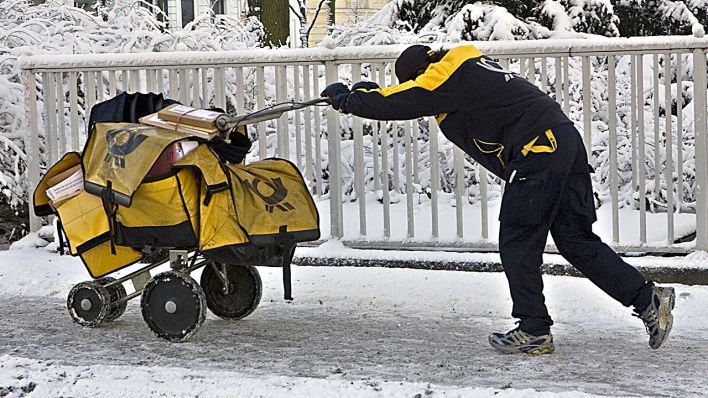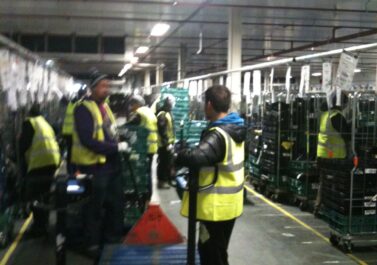
We’ve translated this short report of a postal worker working at Deutsche Post AG and invite you to send us your own reports. We published some experiences of a postal worker in the UK during the early days of the pandemic – feel free to re-read.
The following report, written by a postal delivery worker, describes the working reality in the seemingly ever-growing delivery services sector. Although working conditions at the former state-owned company Deutsche Post AG are certainly not yet as bad as at many other delivery services, everyday working life here is also characterised by stress and heavy workloads. The mood among the workforce is strained, but the resentment is still mostly directed against each other and not against the working conditions.
This text follows on from the report by a Berlin physiotherapist. We would be very happy to receive more reports from the world of work and encourage all readers to send us such reports, so that we can document parts of the proletarian reality on these pages and thus ideally stimulate reflection on the prevailing working conditions.
*
2021 was the most profitable year in Deutsche Post AG’s history. Revenue increased by 22.5% to 81.7 billion euros and profits by around 70% to over 5 billion euros. In 2021, I started working for Swiss Post, because, like so many others, the pandemic meant that everything changed for me. Previously, I had mostly struggled through with several precarious jobs in the field of “something to do with media”. But with Corona, that suddenly came to an end, and I was forced to look for something proper. So I applied for a part-time job as a letter delivery worker at the post office. A starting salary of 14.60 € and even a Christmas bonus sounded pretty good compared to my previous jobs. Okay, there was a flip-side in that the job was initially limited to three months, but after that there was the possibility of getting a permanent position.
As soon as I applied for the job, I was invited to a so-called trial day. This (unpaid) trial work took place on a bright summer day in one of the most beautiful, almost village-like parts of town. Together with an experienced colleague, who seemed to know everyone in her district personally, the work, including a quick visit to the bakery, was done in a relatively short time. That looked pretty good.
A few days later, I was supposed to show up at the so-called handover point (HP) at just before 09:00 in the morning. There I signed my employment contract and was entrusted to a young colleague who was going to train me. She herself had been working at the post office for about a year at that time, but had another job and was actually a student “full-time”. After a corona-related break, she now resumed her studies, so that I could take over “her” district. For about two weeks, I accompanied her in the district, which, in contrast to the trial work, consisted to a large extent of high-rise housing estates. The colleague thought that the work at the post office was alright and also liked the district. We rode old bicycles, which I had to get used to using, even though I ride my bike almost all the time. With the two of us, the work went quite quickly, so we could also take a break every day. When she was on her own, however, she would never take breaks, the colleague confessed, even though six or eight minute breaks are automatically deducted from our working time every day. I heard this from many colleagues.
“Termination by heavy traffic” – The working conditions
In my job, the workday looks like this: I arrive at the HP every morning at 9 a.m., pick up my work materials there (scanner, printer, bicycle, plus various forms) and, ideally, the mail that I have to deliver that day. However, it often happens that the driver who brings the mail from the distribution centre to the HP takes longer, so that my colleagues and I stand around waiting. This gives us the opportunity to talk, which usually revolves around the conditions at the post office. At the beginning of my work, my colleagues kept conspicuously distant from me. In the meantime, however, I have come to realise that this is not just the case for me, but for all the newcomers, because they’ve seen so many newcomers come and go. This was also the case for a young colleague who had started as a delivery person shortly before me. After only a few days, I didn’t see him anymore and, after asking a colleague, I learned that he had already given up, like many before him. He was very poorly trained, had no idea how the scanner worked correctly and was then thrown in at the deep end, having to deliver alone in his district, which made him despair. No wonder he gave up.
In addition to the personal training with a colleague in the district, there are also two training sessions in the distribution centre during the first two weeks. One training session revolves around the postal truck and is primarily a driving course for the colleagues who use it for deliveries. For me as a “cyclist”, this is a waste of time, because even the test ride on an e-bike is irrelevant for practical purposes, since only the full-time employees ride them. During the second training session, the scanner and everything to do with delivery was then taught in quick succession. At the same time, commercials for the post office with Jürgen Vogel were running on a monitor on a continuous loop. Funny, in these films the delivery people are all super happy with their modern, sustainable e-trikes, e-cars, etc., while we have to work with our completely overloaded, ancient bicycles. This must be a commercial about the future of the postal service.
But back to the present. Now I have to deliver to my district alone for the first time. And I’m completely lost for the time being. Already for the first parcel I have to print a notification for the customer because the customer isn’t at home, but the printer doesn’t work. I’m standing in front of the mailbox walls of the high-rise buildings like a duck in a thunderstorm, and a lot of other things don’t work either. I think I called my colleague a total of four times to get help from her. I feel completely overwhelmed and lost. That afternoon, I didn’t get back to the HP until around 4pm instead of 1pm, as planned in the work schedule. Fortunately, all hours are paid for the first three months. That’s not the case later on, where you have to finish on time, with some leeway. In the first few days, I usually need much longer than the work schedule predicts. And I also notice how exhausting this job is, not only physically but also mentally. Because later on, it’s only possible to finish on time if you’re constantly thinking ahead: what letters, brochures, catalogues, parcels are coming next, what’s the best way to cycle, where is it better to walk etc.? Because of the time constraints, you are also always stressed about getting your district done. If it’s foreseeable that you won’t make it within the allotted time, you’re supposed to ‘terminate’ work for the day, which means only deliver the items that have absolute priority that day, including parcels, merchandise mail, registered mail, newspapers and magazines, then return to the HP and do the final work there, and only then are you allowed to stop. It is very difficult to know when to stop in order to stay on time, even after a year, and most of the time you end up working unpaid for some of the time. In addition, you have the problem that the mail that has been left behind has to be delivered the next day, which means you have even more work to do. That’s why there are also colleagues who basically don’t stop and always work until they’re done. A full-time employee who started with me told me that he regularly worked until five in the afternoon, and as a full-time employee he starts at six in the morning! To make the time, we also have to break the set rules all the time: We overload the bicycles, we simply drop off mail in high-rise buildings instead of putting it in the mailboxes as prescribed, some parcels are just left outside the door, etc., etc. The post office always threatens us with responsibility for it and told us we are liable for it, but, of course, the bosses also know that the delivery targets are realistic only if you engage in a creative interpretation of the rules.
The works council [workers’ representatives], which keeps popping up in the HP, recommends ‘termination’ in the case of most problems, because only then would the company feel the problems. This is because terminations have far-reaching consequences: the mail has to be re-sorted, possibly also controlled, which means that “unimportant” items, such as junk mail, have to be pulled out for the next day so that the delivery staff have a chance to deliver everything (but usually they don’t think that far ahead and simply send everything out again), there are complaints from customers, etc. Nevertheless, terminations are not an exception, but happen all the time.
The time before Christmas is especially tough. The amount of Christmas mail is barely manageable; parcels, greeting cards, and all companies also want to point out their one-time special promotions and therefore send out huge amounts of advertising. Especially with parcels and other merchandise, which have to be delivered directly to the customers, one loses a lot of time. Fortunately for us, during the pandemic we had the option of so-called “Q delivery” (the Q stands for quarantine), which means that the delivery person signs on the scanner when he or she starts work and this signature replaces the signature of the customer. In addition, no money was allowed to be collected. But now with the expiration of the Corona measures, this procedure is being reversed, which means a significant increase in work.
Otherwise, the work was done under Corona conditions, as probably in many factories. Masks were compulsory at the HP, and when there were cases of illness among our colleagues, we had to test ourselves every morning and always put on our masks when we came into contact with customers. Masks and tests were provided by the post office. There were also some Corona deniers in the workforce who were unvaccinated and some of whom initially resisted getting tested. This led to many heated debates. But in some cases, these colleagues were exactly the ones who showed solidarity in other situations and stood behind people, so that it was best to simply avoid the topic of Corona and otherwise have reasonable relationships with each other.
“Best summer ever” – The mood among colleagues
Before and after the delivery round, there is usually only one topic of discussion: grumbling about the working conditions at the post office. Overall, there is a lot of resentment, but it is usually directed at colleagues in other departments, for example in the preparation department (“how can you sort so badly?!”) or against the planning department (“unaddressed mail again, how am I supposed to manage that?!”), sometimes also against direct colleagues, for example if they are sick or have dropped out the day before and you now have to “clean up” the district again. But sometimes people also talk about how we should go on strike again, reminiscing about the last strike in 2015. An older colleague said that it was “her best summer ever” at the post office. While the train drivers were on strike at Deutsche Bahn, this was also a recurring topic and almost everyone thought the strike was good and demanded that we should also go on strike. But so far, words have not been enough, and when problems arise, the company relies on the works council.
The works council is strongly represented in the company. There are notices everywhere, there are company newspapers, and the person in charge of the council always comes to see us. You can call him if you have a problem, and he often solves minor issues. But when it comes to more fundamental problems, such as the fact that initially there are only fixed-term contracts that are repeatedly extended by three months, he only refers to the campaigns of ver.di and the general works council. In a company newspaper, the works council did not demand the abolition of fixed-term contracts, but only a limitation. Among the colleagues, a kind of insurance relationship prevails in their relationship with the union and the works council. People call and complain when they feel they are being treated unfairly, they often scold them (“they don’t do anything anyway”), but they are not seen as part of the workforce. This is certainly also due to the fact that the works councils we deal with are exempt from duty and therefore they don’t share the daily work routine. That said, it seemsThe composition of the colleagues is a colorful mix. On the one hand, there are many who come from “Postler families” and whose parents, children, siblings, etc. also work at the Post; on the other hand, there are also many who landed in the job from different backgrounds: Stuck working a job while studying, looking for something to transition to after losing a job, no longer wanting to be in the precarious science sector, etc. Thus, the percentage of academics among the posties I have met so far is quite high. Most of the time, the warning comes from them: to me that union representation is still pretty high. In most of my previous jobs, there was usually nothing like that at all, or if there was, it was as an appendage to the bosses. However, it is noticeable that it is mainly the older colleagues who are members of the union, while the younger ones can’t see any sense in it.
“Make sure you don’t get stuck here!”
The working conditions were particularly bad when, for example, they split us up into different areas again. We have to split up when a colleague is sick or on vacation and our HP can’t get a replacement. Then we have to take over the vacant district. This happened frequently, especially during the peak of the Omicron wave. Then, our team leader always tried to move the delivery staff back and forth in order to somehow be able to cover the districts. This meant that you often didn’t deliver in your district, but you had to cover another one. This is especially hard when you don’t know your district and are “running blind”. In such a case, there is no chance of making the target time, and termination is inevitable.
Recently, splitting has been used not only in emergencies such as sudden cases of illness, etc., but specifically to save on personnel costs. This is then called flexibilisation. But why does the company promote an approach that sinks the mood among its employees to the bottom of the barrel? Out of fear of Amazon!
Amazon used to be one of Deutsche Post’s most important customers, but is now increasingly setting up its own delivery structures. In our region, there was a double-digit drop in parcel shipments in the first two months of the year, even though there had been massive growth in this area for years. This is causing panic among the bosses. At a works’ council meeting, we were therefore already sworn in for tougher times.
So what are the prospects? The mood among our colleagues is already tense. The stress at work is already intense “in normal operation”, many have physical problems due to the job, in addition to the pandemic, in which many have been infected and which is psychologically destroying everyone, inflation, which is keeping many people awake, and now Amazon! However, should we succeed in overcoming the accusations among ourselves and recognising that we have the same interests, something nasty could be brewing for the bosses. What could speak against this scenario, however, is the integrative power of the union and the works council. At the end of the year, the collective agreement expires and must be renegotiated. Ver.di could use this to channel its anger in ritualised warning strikes and get a half-baked agreement out of the way. But that certainly also depends on the further social dynamics, which are currently harder to predict than ever. These are exciting times.



